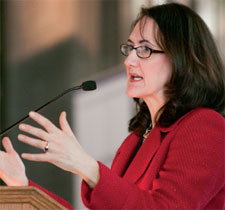 |
|
Dear fellow alumni,
Technology and the Internet have transformed society and enhanced our ability to get things done quickly. Over the coming decades, we’ll no doubt see even more evolution in the tools and technology that make business happen. But what I’m struck by when I spend time with CEOs and other leaders is how they use their time to engage in critical conversations that move their organizations forward. The core of building trust and doing deals and making big change happen is still all about human interaction.
One of Kellogg’s strategic assets is how deeply we understand that collaborative spirit within our student culture. In fact, that’s one of the things I hope to build on: What comes after collaboration? To make really big change happen, you have to bring key stakeholders together around the problems that need to be solved. But how do you get to a meeting of those minds? I don’t just mean consensus. I mean a unique, creative moment when you see through individual concerns and barriers, and then transform that insight into a concrete plan. Then — and here’s where it gets tricky — you must turn that plan into action.
Plenty of people can begin conversations, but they don’t necessarily lead to real, fundamental change. How do we lead conversations that matter, that make change happen? Because that’s how we’ll move organizations forward in the 21st century. That’s what we will need to do to solve the social, economic and environmental challenges that lie ahead.
A lot of people agree that’s a relatively rare skill. But that’s also what they used to say about negotiation, and Kellogg fundamentally changed how business schools taught that. This courageous and collaborative spirit remains at our core today. It’s what will guide us as we re-envision the MBA experience in ways that will strengthen organizations, convene important conversations and truly shape society.
Sincerely,
![]()
Sally Blount ’92


